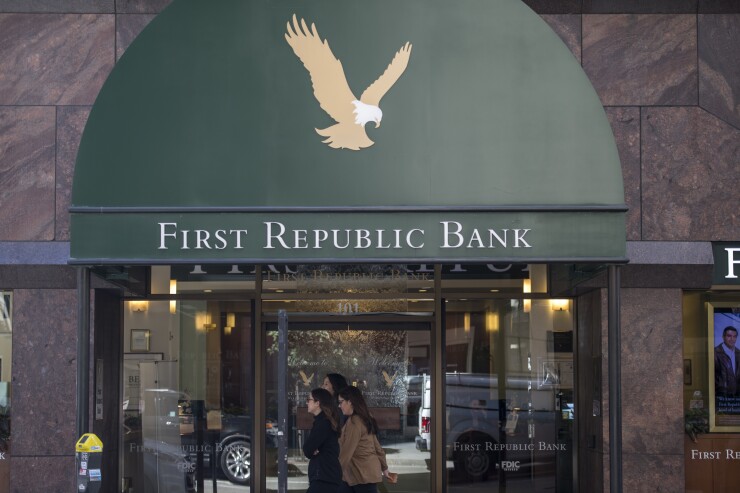Increased funding costs took a larger-than-expected bite out of First Republic Bank's net interest margin, but the effect was more than outweighed by a near-record volume of loan originations, as the San Francisco-based company reported another quarter of solid earnings Friday.
The $205.1 billion-asset bank booked $18 billion of loans during the three months ending Sept. 30, the second-largest total in the company's 37-year history. Red-hot loan growth generated $1.5 billion in quarterly revenue and a bottom-line profit of $445 million, up 20% year over year.
Through the first nine months of 2022, First Republic reported net income of $1.3 billion, up 19% from the same period in 2021. And though the bank will continue to struggle with margin compression over the next few quarters, it won't face any difficulties growing loans or maintaining its sterling credit quality, Founder and Executive Chairman James Herbert said on a conference call with analysts.

"Our challenge throughout this environment will be some margin compression. It will not be credit, client satisfaction or household acquisition," Herbert said.
Top executives at some other banks — from
Unity reported a record quarterly profit of $9.9 million on Friday, but Hughes said in a press release that "prospective macro-economic trends are deteriorating given the significant increase in interest rates."
"We are actively moving to a defensive position to manage our credit exposure," Hughes added.
Herbert, who
"The franchise remains very strong," Herbert said. "Our client service levels are at all-time highs, and most importantly, credit continues to be exceptional."
David Chiaverini, who covers First Republic for Wedbush Securities, wrote in a research note Friday that the bank will likely continue to "outperform from a growth and credit perspective," even in a recession.
The one big negative that emerged from third-quarter results was the increase in the cost of funds, which jumped 39 basis points on a linked-quarter basis. That resulted in downward pressure on First Republic's net interest margin, which shrank by nine basis points and finished the quarter at 2.71%.
According to Chiaverini, First Republic has responded to the
As First Republic continues that strategy into the fourth quarter, its net interest margin is expected to drift lower, close to the 2.65% bottom range in its guidance, President and CEO Mike Roffler said on Friday's conference call, though he added that loan growth and increased yields should limit the downside.
"There is going to be some pressure on the margin here as we go into the fourth quarter and early part of next year … but loan rates are starting to catch up, which is a positive," Roffler said.
Brian Foran, who covers First Republic for Autonomous Research, wrote in a research note that the bank's strategy amounts to a case of "prioritizing client growth over margins."
Timothy Coffey, who covers First Republic for Janney Montgomery Scott, forecast loan growth north of 20% for full year 2022 and in the mid-teens for 2023 in a research note Friday.
First Republic's strategy may serve the company well in the long term, but for now it's giving investors a case of heartburn. The bank's shares closed down more than 16% Friday at $112.59.
A year from now, investors will likely be focusing on credit quality and the overall economic outlook, David Rochester, who covers First Republic for Compass Point Research & Trading, wrote in a research note. That environment "tends to provide material relative support for the shares" of First Republic, "so we continue to like the story," Rochester added.
Besides the net interest margin, First Republic's operation largely hit on all cylinders. Nonperforming assets amounted to 6 basis points of total assets on Sept. 30, while quarterly net charge-offs totaled $1 million, less than one basis point of average loans. Deposits ticked up nearly 19% year over year to $172.4 billion, driven by the bank's rate increases.
Fees in the company's flagship wealth management business totaled $214 million for the quarter, up 2.4% year over year. Investment management fees, the largest single contributor to the unit's bottom line, totaled $142 million. First Republic is predicting a slight decline in the fourth quarter, with investment management fees expected to range from $135 million to $140 million, according to Robert Thornton, the president of First Republic Private Wealth Management.






